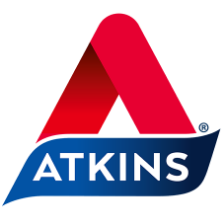- Get inspired
- Atkins Blog
- Atkins: Protein and Fat Come in Optimal (Not High) Amounts
On Atkins, we recommend you consume two to four 115 - 175 gram servings of protein a day. While this is higher than what the RDA recommends (.36 grams of protein per pound of body weight for adults), it’s important to understand that the RDA simply reflects the minimum—not the optimum amount—that an average healthy person needs. Many other factors come into play, including age, gender, activity level and body composition.
The ideal amount of protein should fill you up after your meal (but not uncomfortably stuffed), but hungry in time for your next meal. You should be able to consume the recommended amount of protein through all phases of Atkins, unless you are at the high end of the range and are having a touch time losing weight, in which case you might want to cut your protein intake by 30 grams.
Protein helps you lose weight while on Atkins for a few reasons:
- Protein helps keep you fuller for longer. When you include it with a serving of fiber-rich vegetables (which also fill you up) and healthy fats, you have a delicious, satiating meal. A meal of grilled salmon and steamed broccoli drizzled with a rich Hollandaise sauce or topped with a pat of butter will keep your hunger in perfect control until your next meal or snack.
- Protein stabilizes your blood sugar levels. When you include protein with your meals or snacks, you’re less likely to experience fluctuating energy levels, and you’re able to rein in your cravings for sweets or salt when you’re not experiencing blood sugar highs and lows.
- Eating protein helps you burn more calories because digesting and metabolizing protein burns twice the calories than when you eat carbohydrates.
When it comes to fat, while you are consuming more fat on Atkins than other diets, once again, I wouldn’t consider it a high-fat diet, but a diet featuring optimal levels of fat for a low carb eating pattern. On Atkins, we recommend you consume three 1-tablespoon servings of added fats a day, in the form of butter, salad dressing, olive oil, etc. This is in addition to the fat you will be getting that is naturally occurring in foods such as proteins, eggs, dairy, nuts, and avocado.
Fat helps you lose weight while on Atkins for a few reasons as well:
- When you increase your consumption of fat (in place of some kinds of carbohydrates), you experience more stable energy levels helping you meet your calorie requirements.
- Fat, like protein, keeps you full for longer. And, since it carries flavor, it makes food more satisfying.
- Fat also slows the entry of glucose into your bloodstream, controlling your blood sugar highs and lows, your appetite and your cravings.
Protein and healthy fats are both important parts of Atkins, but fiber-rich carbohydrates (especially vegetables) are just as important. Without these three macro nutrients working together in the recommended amounts, Atkins would not be nearly as effective as it is in helping you improve your health and achieve weight management goals.

Atkins Nutritionist



